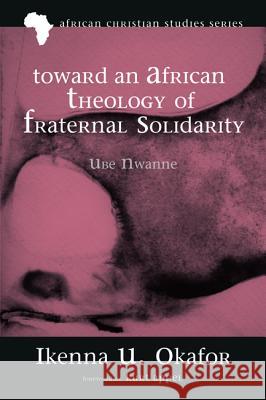Toward an African Theology of Fraternal Solidarity » książka
Toward an African Theology of Fraternal Solidarity
ISBN-13: 9781625645937 / Angielski / Miękka / 2014 / 236 str.
In this book, Ikenna Okafor tackles an interesting and timely topic and demonstrates competence and maturity in developing his insight into Igbo humanism--to make liberation theology from an African perspective into a theology of solidarity and fraternity. With a good narrative style, Okafor critiques the Latin American liberation theological project. And inspired by the hermeneutical implications of ""UBE NAWANNE,"" the evangelical positioning of material poverty and pathos for the poor as defining Christian discipleship is persuasively presented. The potent nwanne idiom guides his critical evaluation of the social teachings and praxis of the Catholic Church. In fact, it is clear that Okafor embarked on a subject matter that is of theological moment and has creative pastoral implications for the Church of Nigeria, the Churches of Africa, and the World Church. ""This is one of very few systematic articulations of an African theology of fraternal solidarity. With profound personal passion, Ikenna Okafor produces a work that will remain important for its enrichment of cultural perspectives in Christian theology. It deserves a place in many libraries and study desks as a book whose relevance to the further development of the dialogue between European and non-European theologies is undoubtable."" --Kurt Appel, University of Vienna, Wien, Austria ""Okafor has offered to contemporary theological and social scientific studies of African social context a new language and framework for critical and creative analysis of African society through a relevant theology of community, social integration, and social transformation through reconciliation. This work offers a good model of how one can appropriate African cultural grammar and maps of the universe in crafting theological metaphors of the church and society which respond to the most pressing challenges facing Africans, African Christianity, and a world in dire need of reconciliation, justice, and peace."" --Stan Chu Ilo, DePaul University, Chicago, IL ""Okafor's 'hermeneutic torchlight' foregrounds indigenous idioms and narratives captured by n r ube nwanne agbala s, unflinching solidarity. He throws new light on contextual theology and offers creative exchange between liberation and solidarity: the demands of justice tango with the command of love. . . . The Nwanne (brother-sister) idiom transforms into Christian theological root metaphor, reinterprets Christ and church, family loyalty and love that excludes no one, blood relationship that melts into family of God, philia that founds agape. The young and old, ordinary readers, native speakers, and foreigners will appreciate the pastoral priority of solidarity in the pages of this book."" --Elochukwu E. Uzukwu, Duquesne University, Pittsburgh, PA Ikenna Ugochukwu Okafor is a presently a postdoctoral research scholar at the University of Vienna, where he obtained both his master's and doctorate degrees in Catholic theology and lectured on Intercultural Theology. The present work is a revised version of his doctoral dissertation. He also works as a pastor in the archdiocese of Vienna."
In this book, Ikenna Okafor tackles an interesting and timely topic and demonstrates competence and maturity in developing his insight into Igbo humanism--to make liberation theology from an African perspective into a theology of solidarity and fraternity. With a good narrative style, Okafor critiques the Latin American liberation theological project. And inspired by the hermeneutical implications of ""UBE NAWANNE,"" the evangelical positioning of material poverty and pathos for the poor as defining Christian discipleship is persuasively presented. The potent nwanne idiom guides his critical evaluation of the social teachings and praxis of the Catholic Church.In fact, it is clear that Okafor embarked on a subject matter that is of theological moment and has creative pastoral implications for the Church of Nigeria, the Churches of Africa, and the World Church.""This is one of very few systematic articulations of an African theology of fraternal solidarity. With profound personal passion, Ikenna Okafor produces a work that will remain important for its enrichment of cultural perspectives in Christian theology. It deserves a place in many libraries and study desks as a book whose relevance to the further development of the dialogue between European and non-European theologies is undoubtable.""--Kurt Appel, University of Vienna, Wien, Austria""Okafor has offered to contemporary theological and social scientific studies of African social context a new language and framework for critical and creative analysis of African society through a relevant theology of community, social integration, and social transformation through reconciliation. This work offers a good model of how one can appropriate African cultural grammar and maps of the universe in crafting theological metaphors of the church and society which respond to the most pressing challenges facing Africans, African Christianity, and a world in dire need of reconciliation, justice, and peace.""--Stan Chu Ilo, DePaul University, Chicago, IL""Okafors hermeneutic torchlight foregrounds indigenous idioms and narratives captured by Ọ nụrụ ube nwanne agbala ọsọ, unflinching solidarity. He throws new light on contextual theology and offers creative exchange between liberation and solidarity: the demands of justice tango with the command of love. . . . The Nwanne (brother-sister) idiom transforms into Christian theological root metaphor, reinterprets Christ and church, family loyalty and love that excludes no one, blood relationship that melts into family of God, philia that founds agape. The young and old, ordinary readers, native speakers, and foreigners will appreciate the pastoral priority of solidarity in the pages of this book.""--Elochukwu E. Uzukwu, Duquesne University, Pittsburgh, PAIkenna Ugochukwu Okafor is a presently a postdoctoral research scholar at the University of Vienna, where he obtained both his masters and doctorate degrees in Catholic theology and lectured on Intercultural Theology. The present work is a revised version of his doctoral dissertation. He also works as a pastor in the archdiocese of Vienna.











